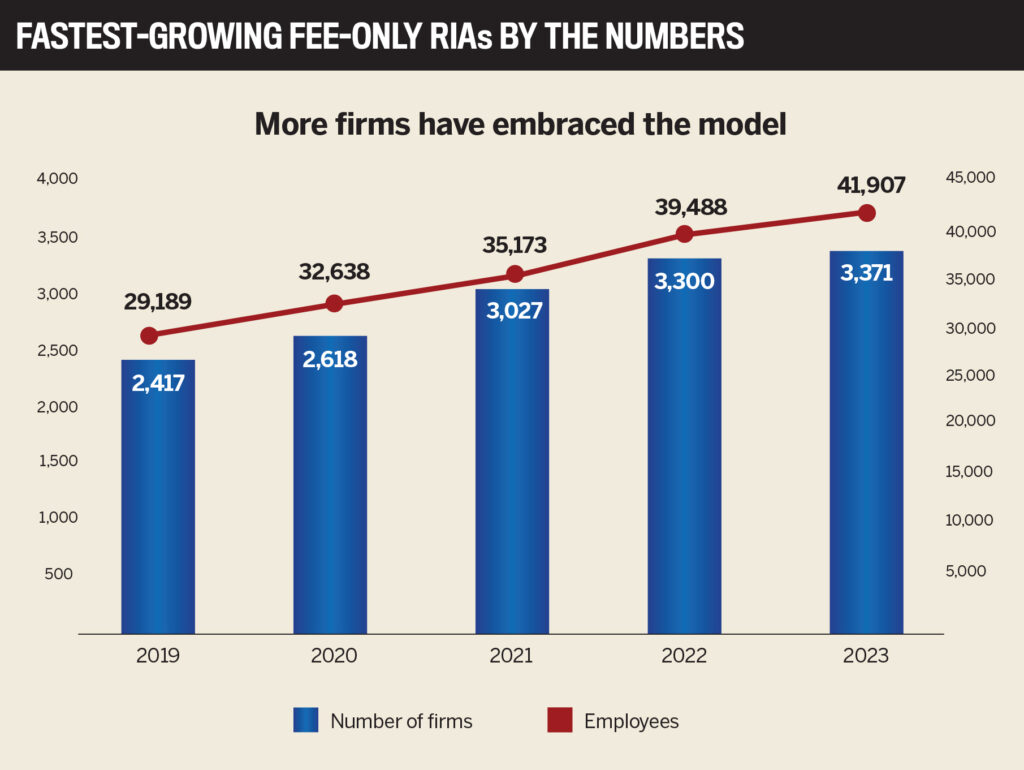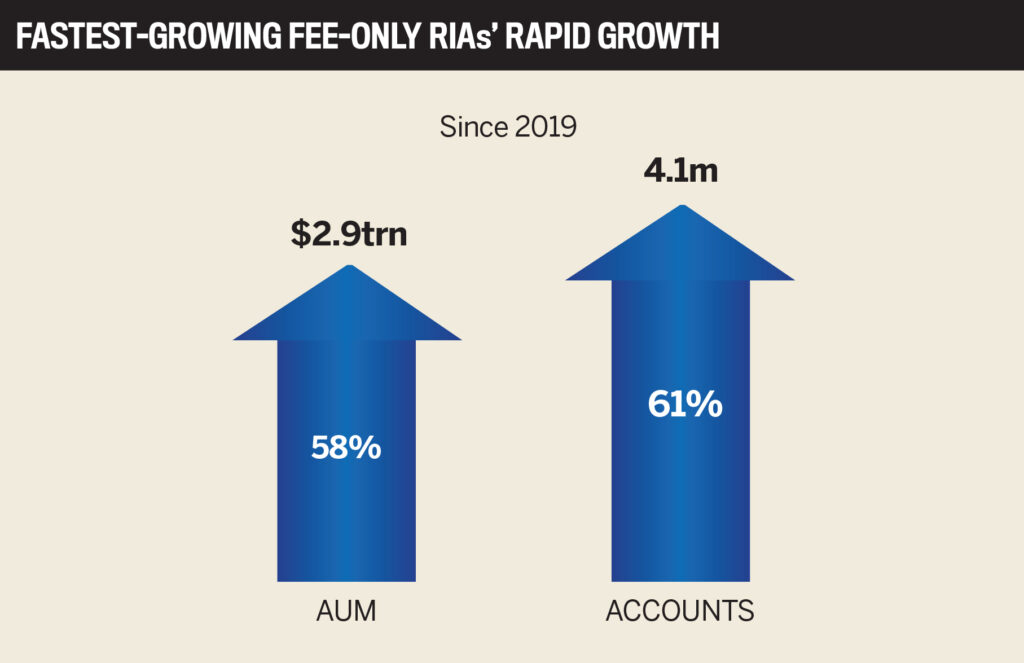-
a direct investment platform that permits clients to invest in companies such as Hipgnosis, SpaceX, and Stripe
-
diversified alternative investments encompassing sports memorabilia, wine collections, artwork, and exotic cars


Jump to Winners | Jump to Methodology
The Fastest-Growing Fee-Only RIAs of 2023 are celebrated for attracting new assets since July 2020. While all 75 winners are trusted and reliable partners for their clients, each firm has its own unique strategy and operating methods.
The fee-only business model, characterized in part by independence from broker-dealers and commission-based products, has been able to flourish, as illustrated by assets under management by fee-only firms growing at an average annual rate of 9.5 percent since 2019 to $2.9 trillion, while the number of client accounts has grown 10 percent on average to 4.1 million. These 75 winners have led the segment in growth over the past three years.

Being aware of what’s required is Destiny’s culture.
Founder and CEO Thomas Ruggie says, “Our prevailing attitude is to get stuff done. It all boils down to creating effectively what I would want if I were the client sitting on the other side of the table.”
However, it’s been more than words that have created that type of atmosphere. A few years ago, Destiny adopted the Entrepreneurial Operating System platform for its executive team.
“It basically helps us determine our goals by working backward. We can say, ‘What are our 10-year, three-year, or one-year goals?’” Ruggie says.
It’s now been rolled out across all departments, enabling weekly or monthly meetings to track progress.
“It’s made us have very structured processes that we consistently walk through; every single team member is involved in one, if not multiple, pieces of the division,” says Ruggie. “Our culture has grown phenomenally because now everybody knows what’s going on across the board.”
The client retention data speaks volumes about the firm’s approach:
99 percent for six of the last seven years
98 percent in the remaining year
Destiny’s reputation and track record are what have enabled the firm to attract clients.
Ruggie says, “I’m the best salesperson in the firm, and yet I’m kind of crappy at it. People laugh at me when I say that because, at this point, I’m a great salesperson, but it’s because I’ve done a great job for the last 32 years, and people know that.”
In addition to serving as wealth managers, operating a family office, and engaging in M&A operations, Destiny has attracted ultra-high net worth clients by capitalizing on various niches. These include:
a direct investment platform that permits clients to invest in companies such as Hipgnosis, SpaceX, and Stripe
diversified alternative investments encompassing sports memorabilia, wine collections, artwork, and exotic cars
The alternative idea was spawned by Ruggie’s personal experiences.
“I’ve got a multimillion-dollar sports collection, but my wife and kids don’t give a damn about it,” he says. “It dawned on me that if I don’t make it home one night, they have no idea what to do with it.
“We’ve replicated that to focus on other people who are just like me and have the same problems. I bring a unique perspective because, like them, I’m a collector.”
Despite having longstanding success, Destiny is catering to today’s generation. The firm recruits advisers who are relatively inexperienced, with four to seven years in the industry.
Ruggie says, “We’re fortunate that we have the ability to bring in somebody like that and build them. If you talk to any of our nine advisers, the goal is for you to get the same treatment and planning process. It’s a lot easier to do that than try to change somebody who’s been doing things their own way for 20 years.”
This extends to attracting more clients through what Destiny calls “next-gen business”. That’s where Ruggie accepts that what appealed to individuals previously might not do so now.
“As our business sits right now, it’s a great business, but it’s effectively what I’ve built and done in my 30 years in the business,” he says. “The reality is that the way we do things right now is not very appealing to Gen Y and Gen Z, so we’ve hired a young person to come in and basically build out a separate business offering focusing on that demographic.
“The goal of our firm is to be a perpetual firm, to be around in 30 or 40 years, and if we do things the way we’ve been doing them for the last 30 years, we’re not going to appeal to the younger generation.”
The Oregon-based firm has a strategic approach: helping owners maximize the after-tax transferable value of their business.
Partner Jared Siegel says, “Taxes end up being an individual’s largest annually recurring nondiscretionary expense, so it’s a way to maximize long-term wealth.”
The decision to taper Delap’s agenda was a calculated move.
“We’ve narrowed our individual focus to expand our collective impact,” says Siegel. “By getting more focused on the types of clients we serve, the types of challenges, problems, and opportunities that we face give us the opportunity for pattern recognition or recurring strategies and experiences that wouldn’t be there if we were serving a broader base.”
For the strategy to work, it requires not only diligence but also discipline, and this can create a need to pause sometimes.
“We had to trust the plan, but doing anything different or saying no to any good opportunity can certainly provoke anxiety,” says Siegel.
The fundamental key to Delap’s success is having the personnel to carry it out. The firm aims its recruitment at individuals with CPA and CFO skills rather than those more geared to selling financial products.

Interestingly, Seigel’s entire team had no prior investment advisory experience, as he purposefully sought people who embrace Delap’s culture and have the client experience uppermost in their minds.
Seigel says, “A natural by-product of wealth is complexity, and we’ve purposefully built our firm to simplify and clarify financial decisions for our clients. We ultimately coordinate that complexity to alleviate that stress and burden that the clients would otherwise struggle with.”
An example of this is the thousands of tax codes nationwide across cities, counties, and states. The genius of Delap’s model is that as a client creates more wealth, the firm can use even more of its skills to guide them.
“We approach planning through a facilitated process rather than a prescribed process,” says Seigel. “But too many choices create the paradox of choice, so we work through a facilitated process where the client gains clarity on what’s most important to them so they can communicate it to us, which then informs what’s most important in our service.”
While the firm has plans to grow and keep iterating, for Delap, even that can be simplified to maintain discipline and focus.
Seigel says, “We’re attempting to be a better firm today than we were last week.”
In pursuit of growth, the firm places an emphasis on its current clients. While that may appear out of sync, it’s clear in the mind of CRO and partner Justin Bakewell.
He says, “We all believe that growth starts with this relentless pursuit of serving our current clients amazingly well. If we help them meet their goals, the rest falls into place.”
Brightside works with three distinct groups:
entrepreneurs and business owners
general partners at private investment funds
multigenerational wealth
“If you don’t fall into one of those buckets, there are other folks that might serve you really, really well, but that’s not where we’re spending our time,” Bakewell says.
This narrowing of its offerings has enabled Brightside to gain a reputation.
Bakewell says, “We are so deeply focused on those different areas from an advisory standpoint that it lends itself to referrals and really becoming deep experts in each one of those spaces, which differentiates us dramatically from some of our peers who have a broader approach to planning and client service.”
One fundamental attribute Brightside has is that its people are predisposed to its client base. The firm switched its focus to the three groups after a detailed internal review.
Bakewell says, “We have decades of experience serving these three types of clients, and we said that’s what we want to focus on. The expertise that we have is what drove our strategy, as opposed to the opposite.”
Brightside is growing, but only in a measured and controlled manner. The firm is not doing it through acquisition or by employing advisers who come with clients. Instead, it is developing junior team members in client discussions from the early stages.
“When it comes to clients, business strategy, and execution, we try to involve everyone from development to implementation,” says Bakewell. “That creates a cultural buy-in.”
New members rotate around the firm’s departments for the first few years to find out what appeals. This way, everyone is in a role in which they are comfortable, but also with an appreciation of the other areas.
Bakewell says, “The feedback that we’ve gotten is that they feel much more included than they would at a more traditional firm, as they get exposure to a wide variety of things and partners.”
Going forward, Brightside is optimistic that it can continue to perform well due to its focus on private markets. Bakewell highlights what he feels are ongoing advantages:
“That’s a deliberate action on our part because the volatility is much less.”
“We think there’s great opportunity as long as you can withstand the illiquidity of the private markets and you plan thoughtfully and underwrite these opportunities in a very diligent way focused on risk.”
Brightside staying in its lane is certainly the future.
“If we’re no longer differentiated in the marketplace, if we really can’t say that we are experts in our three areas and we become diluted, that will affect our client service and our ability to grow in the long run,” Blackwell says.
InvestmentNews selected the Fastest-Growing Fee-Only RIAs based on data reported to the Securities Exchange Commission on form ADV.
To qualify, firms must have met the following criteria: (1) latest ADV filing date is either on or after July 1, 2022, (2) total AUM is at least $100M, (3) does not have employees who are registered representatives of a broker-dealer, (4) managed assets for individual clients during its most recently completed fiscal year, (5) no more than 50% of amount of regulatory assets under management is attributable to pooled investment vehicles (other than investment companies), (6) no more than 25% of amount of regulatory assets under management is attributable to pension and profit-sharing plans (but not the plan participants), (7) no more than 25% of amount of regulatory assets under management is attributable to corporations or other businesses, (8) does not receive commissions, (9) provides financial planning services, (10) is not actively engaged in business as a broker-dealer (registered or unregistered), (11) is not actively engaged in business as a registered representative of a broker-dealer, and (12) has neither a related person who is a broker-dealer/municipal securities dealer/government securities broker or dealer (registered or unregistered) not one who is an insurance company or agency.
To be considered for the list of fastest-growing AUM, firms must have met the criteria in each year (ending July) between 2020 and 2023. In cases where a firm filed more than one annual update to their ADV, the latest filing for the year was used.
